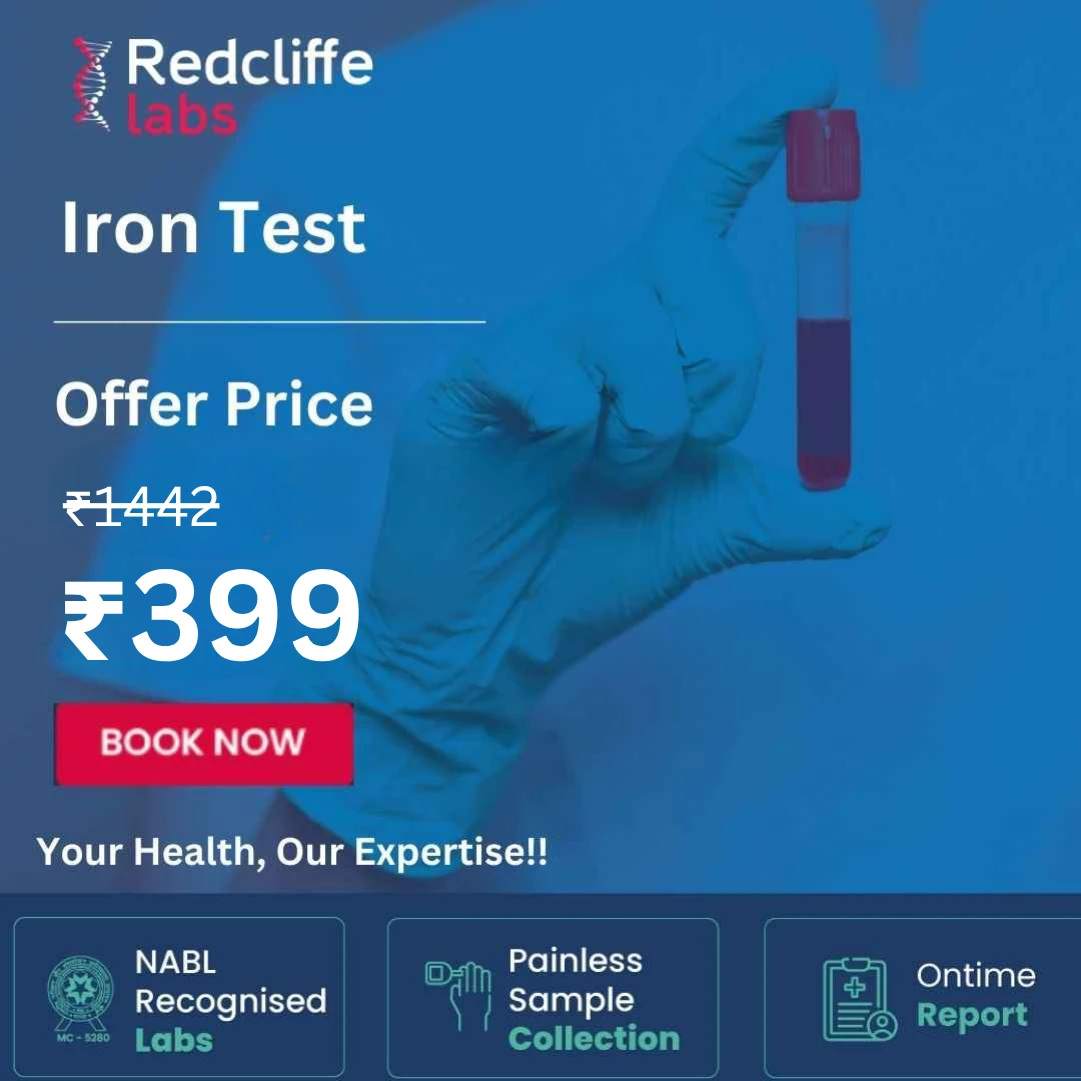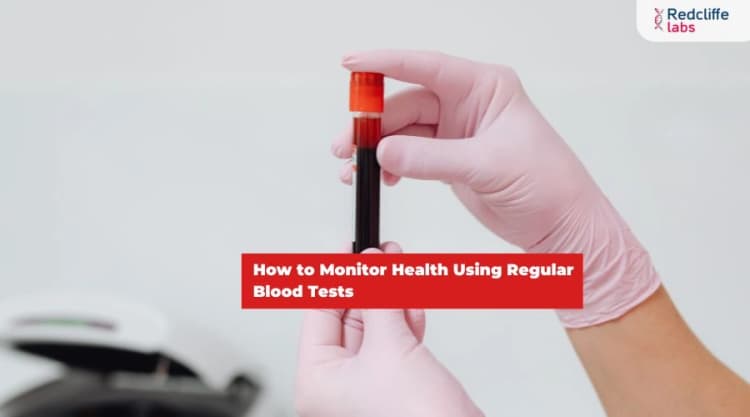The Iron Test measures the serum iron concentration,...Read more
Blood
Unlock special
discount on
this package
Login to Unlock 🔓
NABL Accredited lab*

Booking Benefits Unlocked Worth FREE 799

Report Consultation

Diet Plan
*Available once your report is generated.
At Redcliffe Labs, we have a single goal: to give India its right to quality diagnostics.
Customers served
Tests Processed Everyday
Cities
Collection Centres
World Class In-house Labs
Home Collection Experts
1 Test Parameters
Iron
1 PARAMETER INCLUDED
1 PARAMETER INCLUDED
- Iron, Serum
Top Booked Health Checkup Packages
Reports in 12 hours
|Parameters 94
Reports in 12 hours
|Parameters 96
Reports in 12 hours
|Parameters 89
Reports in 12 hours
|Parameters 96
Reports in 12 hours
|Parameters 90
Verified by Medical Expert

WRITTEN BY
Sheena Mehta

MEDICALLY REVIEWED BY
Dr. Pradeep Lodha
Table of Content
Introduction to Iron test
Iron is an essential mineral that performs several bodily functions, from producing hemoglobin, which carries oxygen in the blood, to maintaining healthy cells, skin, hair, and tissues. It is also important for bone marrow and hormones.
Listed below are iron-rich foods. Have a look!
- Iron-fortified bread and breakfast cereals
- Nuts and seeds
- Dried fruit
- Red meat
- Legumes
- Wholemeal
- Tofu
- Dark leafy green vegetables such as spinach, broccoli, and silver beet.
Besides, many over-the-counter iron-rich supplements and multivitamins help provide adequate iron for body growth and development.
Certain people may likely have trouble getting enough iron due to heavy periods, certain digestive disorders, cancer, or heart failure. Other reasons include inflammatory bowel disease, urinary tract bleeding, premature or low birth weight, pregnancy, or breastfeeding.
Hence, an iron test becomes crucial in this scenario to check whether you have enough iron in the body. Iron deficiency can cause anemia, and higher-than-normal levels can be caused by hemochromatosis. Your doctor may suggest an iron test if he finds symptoms suggestive of abnormal levels in the body. These may include weakness, fatigue, dizziness, joint pain, or changes in skin color.
An iron test can show if you have too much or too low iron levels in your system. Several different iron tests are available to show how much iron is moving through your blood.
If suggested, book an iron test with a home sample collection convenience and reports that meet accuracy and precision from Healthy India ki trusted lab, Redcliffe Labs. So, why wait? Get yourself tested with us now!
Test Details
| Also known as | Iron-deficiency-anemia test, serum iron test, serum ferritin test, serum iron test, iron blood test, serum fe test. |
| Purpose | It looks for iron levels in the blood & detects conditions like anemia & hemochromatosis. |
| Preparation | Do not drink or smoke before the test. |
| Fasting | No Fasting Required |
| Sample type | Blood |
| Available for | Both males and females |
| Get reports within | 12 hours |
| Actual Cost | INR 1442 |
| Cost Offered | INR 399 |
What is the purpose of an iron test?
The amount of iron an individual needs each day depends on age, sex, and whether they consume a mostly plant-based diet. An iron blood test is a crucial test that helps healthcare providers check for the amount of iron in their bloodstream.
Your doctor may recommend an iron test for the following reasons:
- To determine if there is an iron deficiency or overload, The serum iron test helps check if the iron levels in your blood are too low, a sign of anemia. However, if the iron levels are too high, it could be a sign of hemochromatosis.
- Anemia. It occurs when your body doesn’t have enough healthy red blood cells or hemoglobin to carry oxygen to the body’s tissues.
- Diagnose different types of anemia. Iron tests are also recommended to diagnose different types of anemia. A doctor would like to ask you about your medical and family history. He may also do a physical examination and order additional tests such as a complete blood count (CBC) test, hemoglobin test, hematocrit test, and mean corpuscular volume.
- Liver disease. Too little or too much iron in the blood can cause health issues. Hence, a doctor may also suggest a ferritin test to discover liver conditions or restless legs syndrome.
- Adult-onset still disease (AOSD) is a rare condition, but an iron test is also suggested to check for it. Common symptoms include fever, joint pain, rash, and a high ferritin level.
- Check the effectiveness of the disease. Iron tests are also performed to check the effectiveness of treatment for low and high iron levels.
- Hemochromatosis. It is a genetic disease due to the body’s too much iron absorption.
Regardless, if your healthcare provider has suggested an iron test based on your symptoms, you need not delay. Get yourself tested now for early diagnosis and timely intervention.
What are the common symptoms of iron deficiency?
An iron test measures the different substances in the blood to check the levels of iron in the body. Different types of iron tests determine whether iron levels are too low or too high.
Symptoms of too-low iron levels are:
- Weakness or fatigue
- Dizziness
- Pale skin
- Shortness of breath
- Arrhythmia ( a problem with the rate or rhythm of your heartbeat)
- Cold hands and feet
- Inflammation or soreness of your tongue
- Brittle nails
- Chest pain
Symptoms of too-high iron levels are:
- Fatigue
- General weakness
- Irregular heartbeat
- Joint pain
- Stomach ache
- Unexplained weight loss
- abdominal pain
- Loss of interest in sex
- Changes in the color of the skin
What are the different types of iron tests?
Different types of iron tests that help a healthcare provider understand your condition better include:
- A serum iron test is mainly suggested to check how much iron is in your blood.
- The transferrin test measures transferrin, a protein that transports iron through the blood to various tissues, such as the liver, spleen, and bone marrow.
- Total iron-binding capacity (TIBC). A healthcare provider may suggest the test to measure how well iron attaches itself to the transferrin and other proteins in the blood.
- Ferritin blood test is another test that checks for iron levels. It tells the doctor whether your body is storing the right amount of iron to stay healthy.
- Unsaturated iron-binding capacity (UBIC): This test helps measure how much transferrin is not attached to iron.
What does the iron test measure?
The iron test measures the level of iron in the body. Our body cannot produce iron and absorb it from the foods or supplements we eat.
In healthy individuals, over 50 percent of iron is stored in red blood cells of a blood called hemoglobin. However, insufficient iron levels and unhealthy individuals fail to meet the body's needs. This usually occurs due to the following reasons:
- Needing more iron from foods or supplements.
- In conThecannot absorb the foods consumed.
- For conditions such as celiac disease, iron is required during pregnancy or childhood.
- Conditions such as menstrual bleeding, peptic ulcer, and colon cancer cause excess blood loss.
Additionally, other scenarios include a person who is healthy but has anemia that develops over a long period. It does not show any symptoms in the beginning, but gradually, they begin to appear, such as fatigue, weakness, headaches, and pale skin. Hence, the iron test is crucial for accurate diagnosis, followed by treatment plans.
How can you prepare for the iron tests?
An iron test is usually performed in the morning and doesn’t require special preparation. However, following a few instructions will help you get an accurate iron blood test report.
- No fasting: No fasting is required to check low to high iron levels in the blood. Consult your doctor, who may suggest fasting before the test, depending on your medical condition. No smoking or drinking (except water) is allowed to help improve the accuracy of your test result.
- Over-the-counter medicines: If you are taking any over-the-counter medicines for arthritis, headaches, or other minor joint and muscle pain, inform your doctor. He may suggest not consuming them before the test, as some ingredients can interfere with the test results.
- Avoid strenuous exercises: The iron test is a blood test, so it is better to avoid strenuous exercises. They can cause hormonal fluctuations and thus make you uneasy before the test.
Note: An open-ended discussion with a healthcare professional is necessary before taking the iron test.
What is the procedure for the iron test?
An iron test is ordered to check the iron levels in your body. It involves collecting a small amount of blood from your vein.
After you have booked an iron test from Redcliffe Labs, our phlebotomist will come to your home with a blood sample collection kit at the given time.
He carries a field of expertise in collecting blood samples and ensuring painless blood draws.
Here is a step-by-step guide to iron blood test home sample collection:
- The phlebotomist will search for a suitable vein in your arm.
- Once he finds that, he will tie a tourniquet band around the arm, ensuring the vein is visible.
- He will clean the site with a disinfectant and then insert the needle.
- The blood will be collected in a vial or test tube and sent to a laboratory for analysis.
- An iron blood test report is typically available within 12 hours. Download the report through the website https://redcliffelabs.com/.
What are the risks associated with the iron test?
There is very little risk associated with an iron blood test. You may feel slight pain or have bruises at the puncture site. However, most symptoms go away quickly.
Other risks associated with having blood drawn include fainting, feeling lightheaded, or dizziness before or after the test. Kindly inform the phlebotomist to be more patient and careful.
Nevertheless, if the symptoms do not go away on their own or there is excessive bleeding, seeking immediate medical assistance is advised.
What does the iron test report indicate?
The iron test report indicates normal, low, or high iron levels. Your healthcare professional will consider your symptoms, medical history, symptoms, and age to understand your specific iron test results.
Normal results:
- Iron: The normal value range in males is 50 to 150 mcg/dL and 35 to 145 mcg/dL in females.
- Total iron binding capacity (TIBC): The normal value range in males is 175 to 505 mcg/dL, and in females, 149 to 492 mcg/dL.
- Iron Saturation: Males: 20% to 50%; females: 15% to 45%
Note: These values may vary slightly among different laboratories.
If one or more iron tests show lower-than-normal iron levels, it may indicate:
- Iron deficiency anemia
- Another type of anemia
- Thalassemia
- Not enough iron in the diet
- Intestinal conditions
- Pregnancy
If one or more iron tests show higher-than-normal iron levels, it may indicate:
- Hemochromatosis
- Hemolytic anemia
- Lead poisoning
- Liver disease
- Hepatitis
- Frequent blood transfusions
How can you prevent iron deficiency anemia?
You can prevent iron deficiency anemia by treating the causes of blood loss or problems associated with iron absorption causing this condition.
It is vital to maintain iron levels in the body. This is possible by eating a healthy diet that is an excellent source of iron and vitamin C.
| Iron-rich foods | Iron-rich fruits |
| Beans, dried fruits, eggs, lean red meat, salmon, sardines, iron-fortified breads, and cereals. |
Oranges, strawberries, tomatoes, watermelon, and prune dried apricots, |
| Peas, black-eyes peas, tofu, dark green vegetables, iron-rich pastas, grains, and rice. | Raisins, figs, avocado, and dried peaches |
Conclusion
Iron is an essential mineral that your body uses to make hemoglobin. Iron deficiency can cause weakness, frequent infections, coldness, and delayed mental growth in children, among other symptoms. On the other hand, too much iron can cause general weakness, joint pain, and belly pain, among other signs.
In both cases, a blood test is required for early detection of a condition and treatment without delay.
Book Iron Test from Redcliffe Labs today for INR 399 Only!
If suggested, book your appointment for an iron test without delay. The iron test price at Redcliffe Labs is INR 399 only. Enjoy the convenience of home sample collection and accurate reports within 12 hours. Express booking slots are also available, allowing you to pick up your iron test blood sample within 45 minutes. So, why wait? Download the Redcliffe Labs mobile app or call us to book a test.

Below are guidelines to book an iron test online from Redcliffe Labs:
- Go to the Redcliffe Labs website.
- Search for the "Iron Test."
- Click on the iron test. You will see details, including the test price.
- Follow the prompts to book your test.
- Complete the payment process.
Note: After booking, you will receive a confirmation via SMS and WhatsApp.
5 Simple Steps to Manage Your Health with Redcliffe Labs
Quick, Simple & Convenient; trusted care delivered to your doorstep.

Start Your Online Booking
Open the Redcliffe Labs website/app. Select the test or package and enter your details. Schedule the service for your preferred slot.

Live Tracking
Stay updated with real-time tracking for a smooth and timely home sample collection.

Sample Collection
Our certified experts ensure a smooth, hygienic, and fully compliant sample collection experience.

Doctor-Verified Smart Reports
Every report is clinically checked by expert doctors and shared with smart, actionable insights.

Your Health Journey Continues Post Reports
Consult with our expert medical team to get actionable insights to improve your health.
Nearby Labs(9)
Redcliffe Labs Noida

MC-5280
Redcliffe Collection Center
Redcliffe Collection Center
Redcliffe Collection Center
Redcliffe Collection Center
Redcliffe Collection Center
Redcliffe Collection Center
Redcliffe Collection Center
Redcliffe Collection Center
Frequently Asked Questions
What is an iron test?
What is the price of an iron test?
Why would I need an iron test?
What do iron test results indicate?
How should I prepare for an iron test?
How is the iron test performed?
What are normal iron levels in the blood?
What can cause low iron levels?
What can cause high iron levels?
How long does it take to get iron test results?
Are there any risks associated with an iron test?
What symptoms might indicate a need for an iron test?
How often should I get my iron levels checked?
Can I book a Iron Test near me?
Can I book a home collection for a Iron Test?
Health Articles & Blogs
My Health
Stay informed with our expert health articles and blogs. Explore comprehensive guides on diseases, nutrition, preventive care, and wellness tips to help you make better health decisions.
What is SGPT in Blood Reports? Everything You Need to Know

Capsicum (Shimla Mirch) 101: Benefits, Nutritional Value, Uses and More

Normal Calcium Levels: Range, Symptoms & Causes of Imbalance

Home Remedies to Get Rid of Cold in Babies: Safe & Natural Relief for Infants
Discover safe home remedies to get rid of cold in babies. Learn natural and gentle relief methods to ease cough, congestion, and cold symptoms in infants.

How Often Should You Get a Full Body Health Checkup?

Understanding BUN Test Normal Range & Results: High, Low & Normal
Understanding BUN test normal range and results helps evaluate kidney health. Learn what high, low, and normal BUN levels mean and when to get tested.

What Level of Lymphocytes Is Dangerous?

How to Monitor Health Using Regular Blood Tests?
Explore My Health
